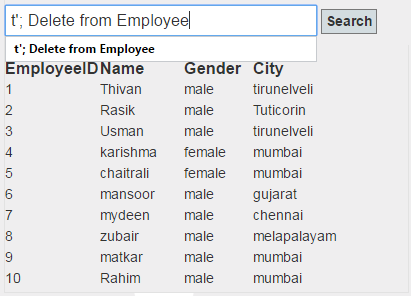In this article we will discuss, How to prevent sql injection using parameterized query in ASP.Net c#. Write a store procedure, that returns the list of products. That store procedure takes input parameter as @name.
We will be using employee table
Step 1: Create a table using the following script with data:
CREATE TABLE[dbo].[Employee](
[EmployeeID] [int] IDENTITY(1,1) NOT NULL,
[Name] [nvarchar](50) NULL,
[Gender] [nvarchar](50) NULL,
[City] [nvarchar](50) NULL,
CONSTRAINT[PK_tbl_Employee] PRIMARY KEY CLUSTERED
(
[EmployeeID] ASC
)WITH (PAD_INDEX = OFF, STATISTICS_NORECOMPUTE = OFF, IGNORE_DUP_KEY = OFF, ALLOW_ROW_LOCKS = ON, ALLOW_PAGE_LOCKS = ON) ON [PRIMARY]
) ON[PRIMARY]
GO
SET IDENTITY_INSERT[dbo].[Employee] ON
INSERT [dbo].[Employee] ([EmployeeID], [Name], [Gender], [City]) VALUES (1, N'Thivan', N'male', N'tirunelveli')
INSERT [dbo].[Employee] ([EmployeeID], [Name], [Gender], [City]) VALUES (2, N'Rasik', N'male', N'Tuticorin')
INSERT [dbo].[Employee] ([EmployeeID], [Name], [Gender], [City]) VALUES (3, N'Usman', N'male', N'tirunelveli')
INSERT [dbo].[Employee] ([EmployeeID], [Name], [Gender], [City]) VALUES (4, N'karishma', N'female', N'mumbai')
INSERT [dbo].[Employee] ([EmployeeID], [Name], [Gender], [City]) VALUES (5, N'chaitrali', N'female ', N'mumbai')
INSERT [dbo].[Employee] ([EmployeeID], [Name], [Gender], [City]) VALUES (6, N'mansoor', N'male', N'gujarat')
INSERT [dbo].[Employee] ([EmployeeID], [Name], [Gender], [City]) VALUES (7, N'mydeen', N'male', N'chennai')
INSERT [dbo].[Employee] ([EmployeeID], [Name], [Gender], [City]) VALUES (8, N'zubair', N'male', N'melapalayam')
INSERT [dbo].[Employee] ([EmployeeID], [Name], [Gender], [City]) VALUES (9, N'matkar', N'male', N'mumbai')
INSERT [dbo].[Employee] ([EmployeeID], [Name], [Gender], [City]) VALUES (10, N'Rahim', N'male', N'mumbai')
SET IDENTITY_INSERT[dbo].[Employee] OFF
Store procedure:
CREATE PROCEDUREusp_SearchEmployee
@Namenvarchar(50)
AS
BEGIN
SELECT * from Employee
WHERE Name like '%'+ @Name +'%'
END
Step 2: Copy and paste the following code.
Default.aspx:
<table style="border: 1px solid #e2e2e2; font-family: Arial">
<tr>
<td>
<asp:TextBox ID="txtName" runat="server"></asp:TextBox>
<asp:Button ID="btnSearch" runat="server" Text="Search" OnClick="btnSearch_Click" />
</td>
</tr>
<tr>
<td colspan="2">
<asp:GridView ID="GridView1" runat="server"></asp:GridView>
</td>
</tr>
</table>
Default.aspx.cs:
using System;
using System.Collections.Generic;
using System.Configuration;
using System.Data;
using System.Data.SqlClient;
using System.Linq;
using System.Web;
using System.Web.UI;
using System.Web.UI.DataVisualization.Charting;
using System.Web.UI.WebControls;
public partial class _Default : Page
{
protected void Page_Load(object sender, EventArgs e)
{
if (!IsPostBack)
{
BindData();
}
}
private void BindData()
{
//Create the connection object
SqlConnection connection = new SqlConnection(ConfigurationManager.ConnectionStrings["ShoppingZone"].ConnectionString); ;
// Pass the connection to thecommand object, so the command object knows on which
// connection to execute thecommand
SqlCommand cmd = new SqlCommand("usp_SearchEmployee", connection);
cmd.CommandType = CommandType.StoredProcedure;
// Provide the value for theparameter
cmd.Parameters.AddWithValue("@Name","%"+ txtName.Text + "%");
// Open the connection. Otherwiseyou get a runtime error. An open connection is
// required to execute the command
connection.Open();
GridView1.DataSource = cmd.ExecuteReader();
GridView1.DataBind();
connection.Close();
}
protected void btnSearch_Click(object sender, EventArgs e)
{
BindData();
}
}
Output:
If we input sql injection string, it won’t affect the table.
t'; Delete from Employee

Post your comments / questions
Recent Article
- How to create custom 404 error page in Django?
- Requested setting INSTALLED_APPS, but settings are not configured. You must either define..
- ValueError:All arrays must be of the same length - Python
- Check hostname requires server hostname - SOLVED
- How to restrict access to the page Access only for logged user in Django
- Migration admin.0001_initial is applied before its dependency admin.0001_initial on database default
- Add or change a related_name argument to the definition for 'auth.User.groups' or 'DriverUser.groups'. -Django ERROR
- Addition of two numbers in django python

Related Article